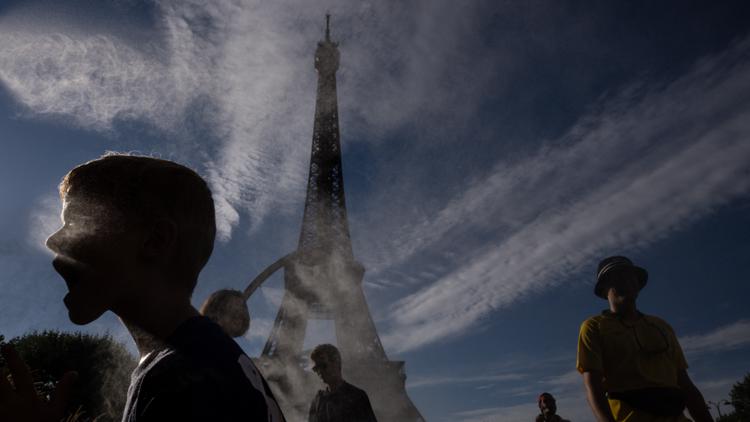PARIS, France — Paris, and the millions of visiting Olympians and spectators, sweltered under an extreme heat wave on Tuesday.
The heat caused at least 23 fatalities throughout the Mediterranean, but that figure is most likey an underestimate, according to the international climate-monitoring group World Weather Attribution (WWA). Most of France was under a heat warning as temperatures hit 105 degrees. Misters and water hoses were broken out for spectators. Athletes at the Summer Games were at increased risk of heat illness, such as heat cramps and exhaustion, including international superstar Simone Biles.
“Don’t come for me about my hair,” Biles wrote on Instagram before the gymnastics team final. “IT WAS DONE but bus has NO AC and it’s like 9,000 degrees. Oh & a 45 minute ride.”
The culprit for the heat was human-caused climate change, a WWA analysis published on Wednesday said. The study found the extreme heat that's plagued France and the entire Mediterranean region would have been between 5.9 degrees and 4.5 degrees cooler in a world before climate change.
"The 1 in 10 year extreme July heat would have been 3°C [2.5 – 3.3°C] cooler in a world without climate change," the WWA analysis said. "Unless the world rapidly stops burning fossil fuels, these events will become hotter, more frequent and longer-lasting."
The analysis was made possible through ongoing developments in attribution science, which uses observational data and statistical methods to estimate how likely and severe an extreme weather event would be today compared to the world before climate change, according to HEATED environmental reporter Emily Atkin.
"If we want the summer Olympics to continue to exist and be safe for athletes, we need to rapidly reduce emissions from these sectors," Atkin wrote in the newsletter. "It’s not enough to say that 'climate change' is screwing with the things we love. Communicators have to also be clear about why climate change is happening, so it’s equally clear what must be done."
The "why" has been confirmed through multiple studies which Atkin shared in her newsletter. The Intergovernmental Panel on Climate Change (IPCC) estimates that 75% of current CO2 emissions come from the burning of fossil fuels. Another 13% of CO2 emissions come from agriculture, forestry, and other land use, the majority of which is caused by deforestation for the sake of beef production.
Extreme heat wasn't the only issue climate change caused at the Paris Olympics; unprecedented rainfall also caused the Seine River to fill up with fecal matter and other waste. Some scientists told the Associated Press that organizers didn't take climate change and its heavier rains properly into account when they laid plans for the river swims.
“They just gambled, flipped the coin and hope for a dry season and it turned out to be the rainiest in the last 30 years,” said Metin Duran, a professor of civil and environmental engineering at Villanova University who has researched stormwater management. "The sewer overflow issue is bound to get worse until climate change is addressed.”
The Associated Press contributed to this article.



